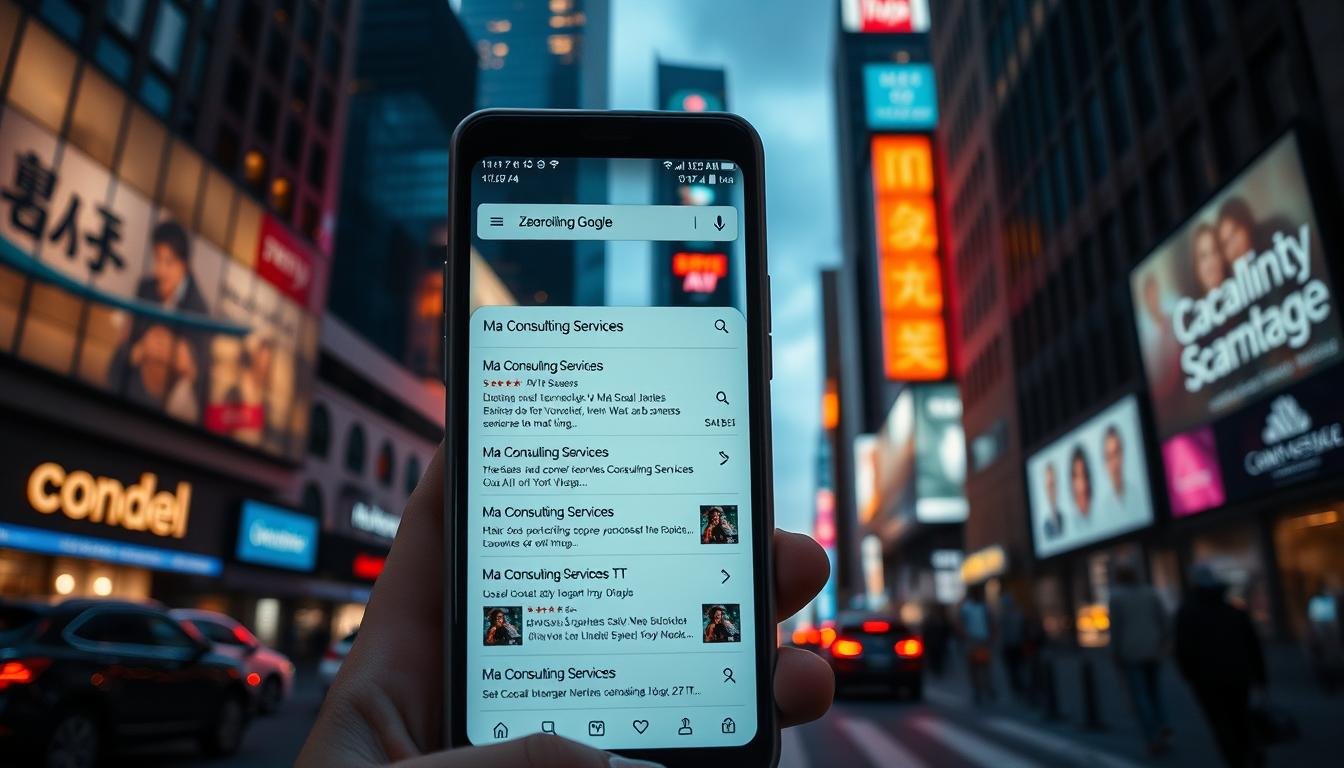Over 50% of Google searches don’t lead to clicks on other content, a Sparktoro report shows. This trend, known as zero-click searches, is changing how we view SEO. Now, SEO focuses more on engaging users right on the search engine page.
Zero-click searches happen when users get what they need right on the search engine page. This includes features like featured snippets and direct answer boxes. With about 60% of searches ending this way, it’s key for businesses to adjust their SEO strategies.
This shift shows many users want answers straight from the search results. For local SEO, this is even more important. Over 46% of Google searches look for local info. Keeping your Google My Business up to date and encouraging reviews can boost your local SEO.
Key Takeaways
- Over 50% of Google searches end without a click on other content (organic or paid).
- Zero-click searches occur when users find the information they need directly on the SERP.
- Featured snippets, knowledge panels, direct answer boxes, and AI overviews are the main types of search features that lead to zero-click searches.
- The shift towards zero-click searches indicates that a substantial portion of the online user base prefers to find answers directly from the search results.
- Regularly updating Google My Business listings and encouraging customer reviews can significantly improve local SEO visibility in zero-click searches.
What Are Zero-Click Searches?
The SEO landscape has changed a lot with zero-click searches. These searches happen when a user finds what they need right on the search engine page. This means they don’t have to click on a website to get the info. Google focuses on making searches easy for users, so zero-click searches are more common. This change is a challenge for businesses that count on people visiting their websites.
Definition of Zero-Click Searches
Zero-click searches give users the answers they want without leaving the search page. In 2020, about 65% of Google searches didn’t lead to a website click. This shows how important it is for businesses to focus on zero-click searches. But, this shift has made it harder for businesses to get people to visit their sites, affecting their sales and leads.
Examples of Zero-Click Searches
There are many types of zero-click searches. Here are a few:
- Featured snippets: Direct answers at the top of search results
- Knowledge panels: Boxes with info on businesses, celebrities, and places
- People Also Ask: Questions with answers that expand
- Local pack: Google Maps listings with business details
- Direct answer box: Instant answers to specific questions
Other examples include stock market updates, sports scores, weather, dictionary definitions, and quick calculators.
Importance in Today’s Search Landscape
Zero-click searches have changed the SEO landscape a lot. Businesses need to find new ways to stay visible as users find answers without visiting websites. Here are some key facts:
| Statistic | Value |
|---|---|
| Google searches ending without a click (2020) | 65% |
| Google searches conducted on mobile devices (US) | 63% |
| Searches leading to another search | 22% |
| AI Overviews in Google search results (US, June 2024) | 12.7% |
As zero-click searches keep growing, businesses need to focus on optimizing for SERP features. This includes featured snippets, knowledge panels, and People Also Ask sections. This way, they can stay visible and engage with users.
How Zero-Click Searches Affect SEO Strategies
The rise of zero-click searches has changed the SEO world a lot. Businesses and content creators must adjust their strategies to stay ahead. Now, the goal is to give quick answers directly on the search engine results pages (SERPs), not just to drive traffic.

To succeed in zero-click searches, focus on giving short, direct answers to common questions. Use structured data markup to help search engines understand your content better. This can make your content more likely to show up in featured snippets and other top spots on SERPs.
A/B testing shows that making your content easier to read can increase your chances of getting zero-click results by 15%.
Implications for Content Creation
SEO strategies now focus more on delivering information than on getting people to visit websites. About 80% of users are happy with the answers they find on the SERP, which means fewer clicks for many sites. To keep up, create engaging, detailed content that answers questions well, even if it doesn’t get clicked.
The Role of Search Engine Results Pages (SERPs)
SERPs are key in the zero-click search world. Features like featured snippets and knowledge panels help brands show up, even if users don’t click through. By optimizing for these, businesses can stay visible in search results.
Using structured data and schema markup can boost your visibility in SERPs by up to 30%. It’s a vital part of modern SEO.
Adjusting Your SEO Approach
To thrive in the zero-click search era, businesses need to change how they measure success. Include impressions and other visibility metrics, not just clicks. Local SEO is also critical, as local searches often lead to zero-click results like maps and local listings.
Keep your name, address, and phone number (NAP) the same everywhere. Encourage positive reviews on Google and Yelp to boost your local SEO and grab zero-click opportunities.
Local SEO and Zero-Click Searches
For businesses with a physical presence, local SEO is key. Many users find what they need on the search engine results page (SERP) without visiting a website. With nearly 46% of Google searches looking for local info, it’s vital to focus on local SEO.
To boost local SEO, claim your Google My Business listing and keep your info current. Ask customers to leave reviews, as they help your local search visibility. Also, use location-based keywords in your content to show up in local searches.
The Significance of Local Listings
It’s important to have your business’s NAP (name, address, phone number) details right and consistent online. Google checks for this consistency to judge your credibility. Keeping your NAP accurate can help you show up in local searches and bring more foot traffic.
Utilizing Google My Business
Google My Business is a great tool for local businesses. Claiming and optimizing your listing can boost your visibility in Google’s local packs and Maps. Make sure to add your business hours, contact info, and quality images to make your listing stand out.
Optimizing for Local Intent Searches
To catch local intent searches, create content that meets your local audience’s needs. This could be blog posts, videos, or infographics that show your local expertise. By providing valuable, local content, you can attract more customers and show up in local searches.
Strategies to Optimize for Zero-Click Searches
To optimize your website for zero-click searches, focus on creating content that answers user queries directly. Use structured data to make your content more visible in search results. With AI and advanced search technologies, zero-click searches are now over 68.7% of all Google clicks.
Targeting long-tail keywords and optimizing for featured snippets can boost your zero-click results. This approach can significantly improve your visibility.
Creating Featured Snippets
Featured snippets are a common zero-click result, giving users a quick summary from a website. To get featured snippets, create content that directly answers user queries. Make sure your content is concise and informative.
Use headings and subheadings to help search engines find and extract relevant information. Also, make your content mobile-friendly and optimized for voice search. These factors can greatly improve your zero-click search visibility.
Leveraging Structured Data
Using structured data, like schema markup, can help your website show up in rich snippets and knowledge graphs. This is key for zero-click searches. Structured data gives search engines more context about your content.
E-commerce sites can benefit a lot from structured data. It helps your products show up in carousels and rich snippets. This can capture valuable zero-click search traffic.
Monitoring and Analyzing Results
It’s important to keep an eye on how your website performs in search results. Use tools like SEO Writing Assistant for content optimization. The Rich Results Test checks if your structured data is working right.
Position Tracking helps you see how your keywords are doing. By regularly checking and tweaking your strategies, you can improve your website’s visibility and growth.
FAQ
What are zero-click searches?
Zero-click searches are when you get answers right on the search engine page. This happens through features like featured snippets or quick answers. You don’t need to click on a website to get the info.
What are some examples of zero-click search results?
Zero-click results include many things. You can find featured snippets, knowledge panels, and People Also Ask sections. There are also Google Maps listings, stock updates, sports scores, and weather forecasts. Plus, dictionary definitions and quick calculators are available too.
How do zero-click searches impact SEO strategies?
Zero-click searches change how we do SEO. We now focus more on being seen in search results than just getting people to visit our sites. To do well, make sure your content answers questions directly and clearly. Use structured data and focus on local SEO too.
What is the importance of local SEO in capturing zero-click searches?
For businesses with a physical spot, local SEO is key. Many local searches lead to zero-click results. To get better at local SEO, claim your Google My Business listing and keep your info current. Get reviews and use location-based keywords.
How can I optimize my content for featured snippets?
To get featured snippets, pick the right keywords. Use headings for your answers and keep your answers short and clear. Add schema markup to help search engines understand your content better.
What metrics should I use to measure success in a zero-click search landscape?
Use different metrics to see how you’re doing in zero-click searches. Look at impressions and other visibility signs. Use tools like Position Tracking to check your keyword rankings and SERP features. Then, adjust your SEO plan to do better in zero-click searches.
Source Links
- https://www.outerboxdesign.com/articles/seo-services/zero-click-search-results-for-seo
- https://www.boostability.com/content/zero-click-searches/
- https://www.webfx.com/blog/seo/zero-click-seo/
- https://www.imaginuity.com/blog/what-is-zero-click-search/
- https://digitalguider.com/blog/what-are-zero-click-searches/
- https://www.singlegrain.com/seo/zero-click-seo/
- https://www.enilon.com/blog/how-zero-click-searches-are-changing-seo/
- https://www.theadfirm.net/the-rise-of-zero-click-searches-and-what-it-means-for-seo-strategy/
- https://www.tekrevol.com/blogs/the-impact-of-zero-click-searches-on-seo-strategies/
- https://www.semrush.com/blog/zero-click-searches/
- https://www.wordstream.com/blog/zero-click-searches
- https://hurrdatmarketing.com/seo-news/rise-zero-click-searches/
- https://nogood.io/2024/03/20/zero-click-searches/
- https://www.oncrawl.com/technical-seo/zero-click-search-what-is-it-how-optimize-for-it/



